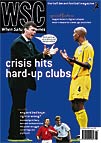 There are no shortage of suitors for Sepp Blatter's seat at FIFA. Alan Duncan profiles the interest from Africa
There are no shortage of suitors for Sepp Blatter's seat at FIFA. Alan Duncan profiles the interest from Africa
Long since giving up the 400 metres, at which he was Cameroon champion, the 55-year-old Confederation of African Football president Issa Hayatou still bears the edgy look of a man wary of being caught off guard by the sound of a starting pistol. In his 14 years at the helm of CAF, Hayatou has made few false starts but now faces an uphill struggle if he is to land the highest office in world football.
Born into a family of sultans in the arid northern Cameroonian town of Garoua, Hayatou had a relatively privileged upbringing and was later sent to the capital Yaoundé to further his education. Not short of patrons, he landed the coveted position of director of sport at the Ministry for Youth and Sport while still in his early twenties. By the age of 26 he became general secretary of Fecafoot – the Cameroonian football federation – rising to president a few years later.
Hayatou’s ascendancy among the CAF elite came in 1986 when he was elected to the executive committee. Within 18 months he had successfully challenged interim leader Dr Halim of Sudan for the presidency following the sudden death of long serving leader Yndekachew Tessema of Ethiopia. It was a popular victory by the candidate of a new generation.
To the outside world African football was still perceived as remote and inaccessible, but under Hayatou’s leadership the confederation’s flagship tournament, the biennial Nations Cup, was expanded from eight nations in 1990, to 12 in 1992 and finally to its current format of 16 nations by 1994. The success of Cameroon at the 1990 World Cup in Italy, along with the mass exodus of players from the continent, no doubt played their part in raising Africa’s profile, but it was Hayatou who seized the moment, lobbying hard to get the contintent’s quota of World Cup places increased from the two in 1990 to five in 1998.
Perceived as a moderniser, Hayatou’s genius has lain less in new initiatives than in a bold insistence on mirroring the developments of the game in Europe. That has led to the transformation of the moribund Champions Cup to the money-spinning Champions League in 1997 and to an increasingly sponsor-driven Nations Cup.
Often criticised for presiding over CAF as he would a sultanate, the Cameroonian can in fact take credit for broadening the Nations Cup hosting rights to include the likes of impoverished Burkina Faso in 1998 and Mali this year. It is, Hayatou has long maintained, part of a wider developmental drive which in terms of infrastructure at least has transformed the footballing landscape in both countries. That the facilities in his native Cameroon are crumbling and decrepit, unable to host even an international junior championship, has long perplexed even his own supporters.
Friendly with many heads of state, Hayatou is often accused of being passive in the face of government interference, preferring to allow FIFA to do the dirty work of bringing national associations into order. Furthermore, while he has never lacked PR skills – arguably his greatest asset – CAF has proved ineffectual in introducing measures to curb the problems of stadium security, responsible for hundreds of deaths last year alone. There is also a continuing air of mistrust over the lack of consistency in bans it hands out to players, coaches and referees.
Yet if Hayatou has a fatal flaw it is perhaps in overrating his popularity in his own backyard – something he discovered bitterly in the 1998 election for the FIFA presidency, when he failed to deliver the African votes en bloc to his long-term ally, the UEFA president Lennart Johansson. Large financial subsidies from FIFA and the hugely popular Goal scheme, whereby associations receive grants of as much as US$700,000 for specific development projects, have meant that Africa has continued to eat out of Blatter’s hand, not that of Hayatou.
If Hayatou wins his latest race, he will have succeeded in the rare accomplishment of unifying Africa; if he loses, he is unlikely to stay on to enjoy the luxuries of his latest monument – CAF’s resplendent new headquarters under construction in Cairo.
From WSC 183 May 2002. What was happening this month